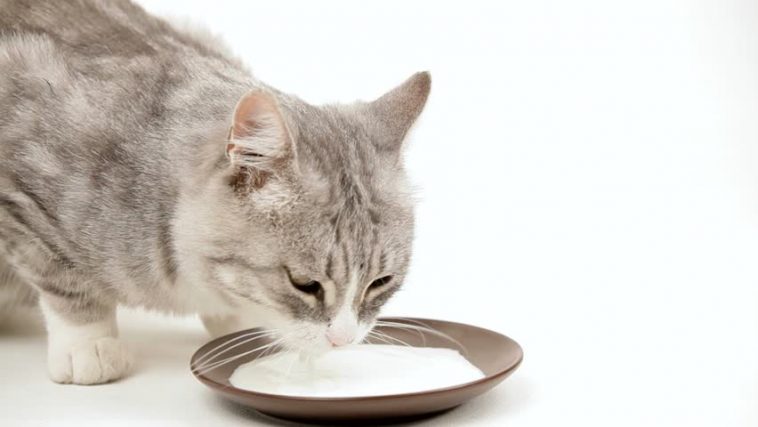Do Cats Need Milk? Or Just Cats Like Milk?
Kittens need their mother cat’s milk. The queen’s milk is the kittens’ primary source of nutrition from the time they are born until they are weaned. At birth, kittens are capable of producing the enzyme called lactase in their gut. Lactase is needed to digest Lactose, the complex sugar in milk, into its simplest components: galactose and glucose. Glucose is absorbed from the gut into the bloodstream then distributed to the different parts of the body. Cells use glucose to produce energy needed to sustain life.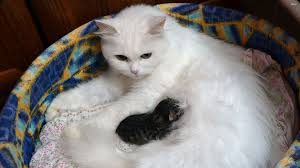
The queen’s milk is the primary source of nutrition for kittens from birth to weaning.
How Lactase Affects Cats?
At this point, it is important to stress that even if kittens have lactase it is still not acceptable to give cow’s milk to orphaned kittens. A mother cat’s milk has a different balance of component nutrients than cow’s milk. Replacing one with the other can cause stomach upset in the newborns. It is best to get a Kitten Milk Replacer product from your veterinarian if needed.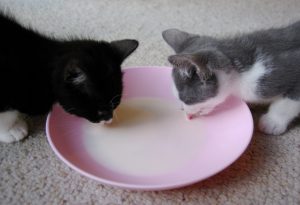
Avoid giving cow’s milk to orphaned kittens or as a supplement to their mother’s milk.
How Does Milk Makes Cats Sick?
Some cats like milk so much that when it is offered to them by their human parents they will drink a lot. Because of the low amount of lactase in their small intestines, adult cats cannot digest most of the lactose in milk and suffer from Lactose Intolerance within about 8-12 hours after drinking. Lactose that is undigested remains in the gut and becomes subjected to bacterial breakdown called fermentation. This process produces gas as one of its by-products. Accumulated gas in the intestine causes flatulence and bloat. This makes some cats vomit and exhibit abdominal discomfort. When too much gas has accumulated, the bowels become stretched from the pressure inside and this brings abdominal pain.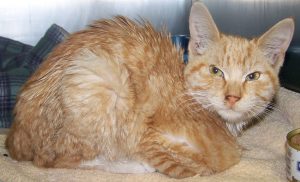
Lactose intolerance can result to bloating, abdominal pain, diarrhea and dehydration.
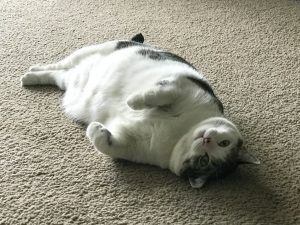
The fat in milk which makes it irresistible to kitty may cause obesity.
What To Do In Case of Lactose Intolerance?
Don’t recommend home care when you have a cat with diarrhea. Some cats can dehydrate fast and it can very likely result in death. If possible, take kitty to the veterinarian immediately so that it has a proper diagnosis and start treatment at once.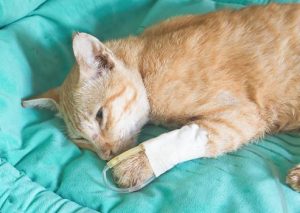
If your cat has diarrhea, promptly take kitty to the veterinarian. Intravenous fluid infusion may be essential to prevent fatal dehydration.
What Can Be Better Alternatives To Milk?
Milk given in small amounts as an occasional treat for kitty is not harmful. But it should not be part of an adult cat’s daily diet. Ask your veterinarian about lactose-reduced or lactose-free milk products suitable for cats. A number of pet parents ask if soy milk is a good alternative to give to cats in place of cow’s milk. The answer would be no. Soy milk usually has added sugar to make it taste better. This places cats at even bigger risk for developing obesity. And soy is vegetable protein, not suitable for the digestive tract of carnivores. An allergic reaction to soy protein may occur. As stated earlier, adult cats like milk but do not have the need for milk in their daily diet. A well-balanced diet, be it home-made or commercial cat food, can provide all the protein that cats need. What they need to drink more of is water! This is the most important nutrient that the body needs yet it is often the most overlooked. Water is important for all the body’s vital functions and is very important to the good health of the urinary and digestive systems. Cats, however, are notorious for not drinking enough water. To encourage your cat to drink more water, get kitty an excellent quality, durable and hygienic water fountain. The fountain makes water circulate for good aeration which gives it a better taste. The flowing water of the water fountain also piques any cat’s innate curiosity and you can be sure they will drink more of it.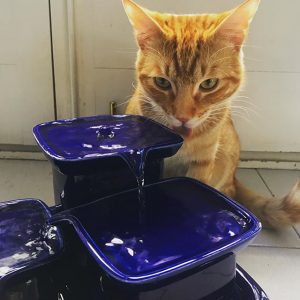
Cats need to drink water more than milk. Investing in a water fountain gives long-term health benefits for your cat because it encourages kitty to drink more water.

